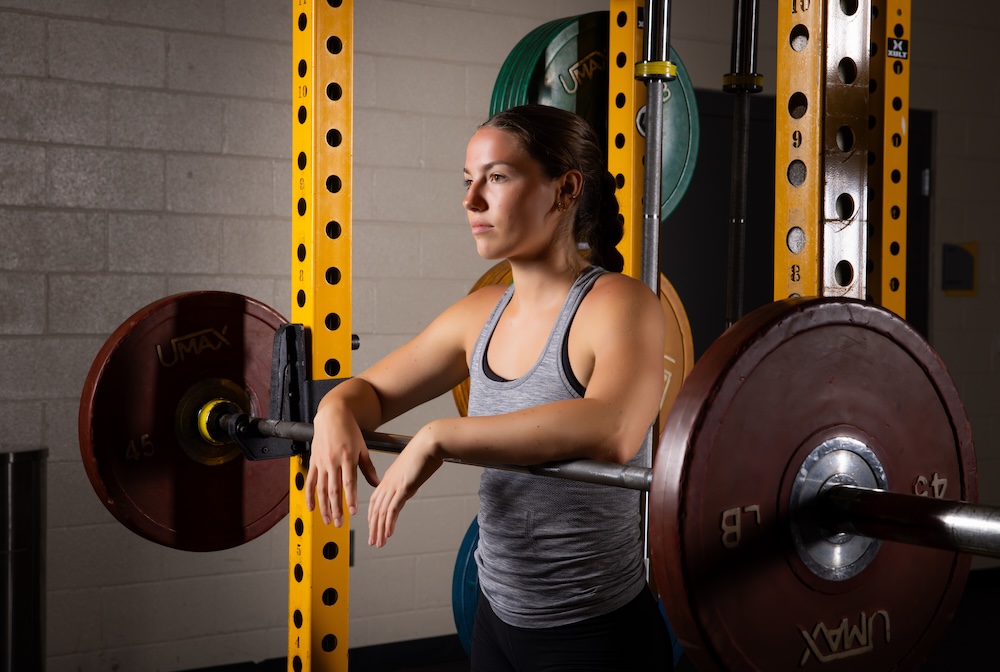

KENNESAW, Ga. | Jul 28, 2025

Now she’s helping conduct a study on CrossFit with Wellstar College of Health and Human Services professor Gerald Mangine through KSU’s Summer Undergraduate Research Program.
“I took Dr. Mangine’s strength and conditioning lecture this past semester, but wasn’t familiar with KSU’s research, let alone in CrossFit,” said Doese, a senior exercise science major. “Dr. Mangine saw the CrossFit sticker on my laptop and asked me if I’d be interested in participating in this study; then he asked if I’d like to do research. Now I’m hooked.”
CrossFit training sessions take in elements of strength, speed, and resistance training. Because of the multiple disciplines, no standard method for measuring the overall intensity or workload exists, which is the problem the study seeks to address. Mangine, who has studied CrossFit for more than a decade and publishes frequently on the topic, noted a single example for measuring workloads in the CrossFit Level 1 coach’s manual, which every licensed coach must read, but the method for measurement was flawed.
Doese said CrossFit coaches and researchers have used VO2 max, which is a measure of the body’s ability to consume and process oxygen, and measurement of lactate, a chemical produced in the blood when the body breaks down carbohydrates during exercise. They’ve also used heart rate, but none of those measures have proven reliable for CrossFit, and the Mangine lab seeks to narrow down a measurement so coaches can prescribe appropriate workouts.
“We're trying to put a number to a feeling,” Doese said. “We're using biomechanics to help quantify workload and then hopefully that’s able to give us a more accurate representation of what's happening in the workout like when you start to feel the burn and how sore you feel afterwards.”
Doese got into CrossFit in high school after finishing her career in rugby and basketball. She was hired on at a gym in 2020 as a receptionist, then took a youth CrossFit class. Between the extreme physicality required of the workout and the community aspect, she got hooked in short order.
“The members in the gym quickly became close friends and excellent mentors that I wanted to be around as much as I could, and doing hard things together only strengthened that bond,” she said. “Not only was I doing things I never thought I would be able to do physically, but I was eating, sleeping, thinking, and connecting better than I ever had before.”
After graduating high school in Woodstock, Georgia, she followed some friends to Kennesaw State. A desire for a medically adjacent career – but not necessarily nursing or medicine – plus her newfound passion for CrossFit drew her to exercise science. Mangine said the universe aligned to put Doese in his class and later in the CrossFit study as a participant and student researcher, especially given her passion for the sport.
“Part of the challenge in research is getting participants in these studies, so not only did she participate in the study, but she texted some of her friends to come in and participate,” he said. “She has picked up on what we do so quickly, she’s already presented, and now we’re working on a couple of papers. She has been knocking it out of the park.”
Doese feels just as fortunate to have found a mentor with high-level interest in CrossFit, too.
“Dr. Mangine’s right here at KSU, and he’s published 5% of all CrossFit studies, which is a huge deal,” she said. “I feel very privileged, very honored to be able to work with him and for him to trust me with a project like this. It’s very cool.”
– Story by Dave Shelles
Photos by Matt Yung
A leader in innovative teaching and learning, Kennesaw State University offers undergraduate, graduate, and doctoral degrees to its more than 51,000 students. Kennesaw State is a member of the University System of Georgia with 11 academic colleges. The university's vibrant campus culture, diverse population, strong global ties, and entrepreneurial spirit draw students from throughout the country and the world. Kennesaw State is a Carnegie-designated doctoral research institution (R2), placing it among an elite group of only 8 percent of U.S. colleges and universities with an R1 or R2 status. For more information, visit kennesaw.edu.